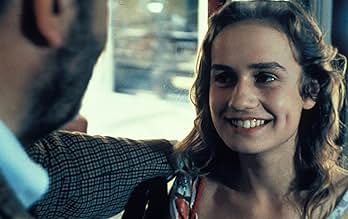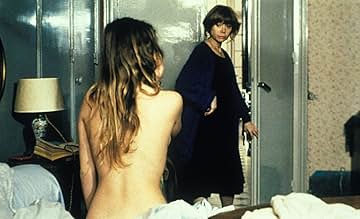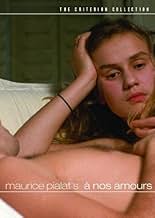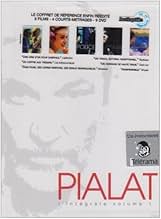À nos amours
- 1983
- Tous publics
- 1h 39m
IMDb RATING
7.1/10
7.6K
YOUR RATING
An erratic young woman's family desperately tries to prevent her increasingly erotic ways.An erratic young woman's family desperately tries to prevent her increasingly erotic ways.An erratic young woman's family desperately tries to prevent her increasingly erotic ways.
- Director
- Writers
- Stars
- Awards
- 4 wins & 3 nominations total
- Director
- Writers
- All cast & crew
- Production, box office & more at IMDbPro
Featured reviews
15-year old Suzanne (Sandrine Bonnaire) is a precocious child, living with her mother, her career-driven brother, and her sometimes overbearing father (played by Maurice Pialat). She has recently split from her boyfriend and is intent on moving from man to man in search of sexual pleasures and guardianship. When her father splits from her mother and moves out, home life becomes unbearable as her mother and brother disapprove of her lifestyle. She is most comfortable in the arms of a man, be it one of her seducers or her father. Men seems to flock to her, as she is pretty, charming and is happy to accommodate her admirers.
This is the second film that I've seen directed by French master Maurice Pialat, the other being the excellent L'Enfance Nue. They are both similar films in terms of themes and execution, and tell the familiar coming-of-age story from an original perspective. Whereas the former was a sledgehammer portrayal of a young juvenile causing havoc amongst the various foster homes he was placed, where redemption never seems possible, A Nos Amours' Suzanne is a more sympathetic lead character, and her journey is portrayed in a more subtle manner. While it would be shocking to hear of a 15 year old girl bedding a number of men, Pialat is more focused on what drives her to act this way.
She is not a tease, and she doesn't flaunt her body to anyone who will look. Instead, she seems to simply enjoy the comfort of a man. When the father moves away, her home life falls apart and her bed-mates increase. Perhaps Pialat is trying to portray the impact an absent father can have on a child, or that all women need comforting every once in a while. Or maybe this is an individual character study, with no overriding message. What it most definitely is, though, is a wonderfully acted (especially from the young Bonnaire), intelligent, and intriguing film that has Pialat's usual cold detachment alongside a certain intimacy with the lead character.
www.the-wrath-of-blog.blogspot.com
This is the second film that I've seen directed by French master Maurice Pialat, the other being the excellent L'Enfance Nue. They are both similar films in terms of themes and execution, and tell the familiar coming-of-age story from an original perspective. Whereas the former was a sledgehammer portrayal of a young juvenile causing havoc amongst the various foster homes he was placed, where redemption never seems possible, A Nos Amours' Suzanne is a more sympathetic lead character, and her journey is portrayed in a more subtle manner. While it would be shocking to hear of a 15 year old girl bedding a number of men, Pialat is more focused on what drives her to act this way.
She is not a tease, and she doesn't flaunt her body to anyone who will look. Instead, she seems to simply enjoy the comfort of a man. When the father moves away, her home life falls apart and her bed-mates increase. Perhaps Pialat is trying to portray the impact an absent father can have on a child, or that all women need comforting every once in a while. Or maybe this is an individual character study, with no overriding message. What it most definitely is, though, is a wonderfully acted (especially from the young Bonnaire), intelligent, and intriguing film that has Pialat's usual cold detachment alongside a certain intimacy with the lead character.
www.the-wrath-of-blog.blogspot.com
This is the story of a teenage French girl (Sandrine Bonnaire) with a difficult home life. Both her father (who abandons the family) and her older brother (who regularly physically assaults her) seem to have an unnatural interest in her sexuality, while her mother (who may the worst of them all) is a raving hysteric who eggs everyone else on. Not surprisingly, the girl is quite promiscuous, availing herself of any number of boys and men. In an American movie like this, her male paramours would at best be panting dogs and at worst villainous cads taking advantage of a vulnerable girl, but here they're probably the most sympathetic people in the movie!
The young girl is not unsympathetic by any means, but she simply refuses to be a victim and remains firmly in control, and no family member or lover ultimately seems to have much chance against her. She is similar to the kind of "feminist lolitas" that often appear in Catherine Breillat movies like "A Real Young Girl" and "36 Fillete"-- teen girls that are very desirable, but also wise beyond their years and in perfect control of their own sexuality, and thus never simply mere sex objects. It's surprising Bonnaire never worked directly with Breillat because she is a much more self-assured and commanding actress than any of the ones Breillat did work with. I don't know if I believe the IMDb dates regarding Bonnaire's age as her assured acting (and her nude body) suggest that she was somewhat older than the character she's playing here, but she's very impressive regardless. Interestingly, while she became a very formidable actress in her later years (especially in films like Claude Chabrol's "Initiation"), she would not really be one of your more glamorous and sexy French actress. She certainly compares well to her contemporaries at the time like Emmanuelle Beart and Sophie Marceau, but while they would become leading ladies, she stayed more of a character actress.
Ironically, the one problem I had with the movie is that Bonnaire and her character is perhaps TOO self-assured and as an actress Bonnaire tends to dominate the rest of the cast too much. It might be a feminist statement to have young female protagonist who is this self-confident, but I don't know that it's necessarily very realistic.
The young girl is not unsympathetic by any means, but she simply refuses to be a victim and remains firmly in control, and no family member or lover ultimately seems to have much chance against her. She is similar to the kind of "feminist lolitas" that often appear in Catherine Breillat movies like "A Real Young Girl" and "36 Fillete"-- teen girls that are very desirable, but also wise beyond their years and in perfect control of their own sexuality, and thus never simply mere sex objects. It's surprising Bonnaire never worked directly with Breillat because she is a much more self-assured and commanding actress than any of the ones Breillat did work with. I don't know if I believe the IMDb dates regarding Bonnaire's age as her assured acting (and her nude body) suggest that she was somewhat older than the character she's playing here, but she's very impressive regardless. Interestingly, while she became a very formidable actress in her later years (especially in films like Claude Chabrol's "Initiation"), she would not really be one of your more glamorous and sexy French actress. She certainly compares well to her contemporaries at the time like Emmanuelle Beart and Sophie Marceau, but while they would become leading ladies, she stayed more of a character actress.
Ironically, the one problem I had with the movie is that Bonnaire and her character is perhaps TOO self-assured and as an actress Bonnaire tends to dominate the rest of the cast too much. It might be a feminist statement to have young female protagonist who is this self-confident, but I don't know that it's necessarily very realistic.
France dubbed this the best film of 1983, and named the love Sandrine Bonnaire, in her first credited role, as it's most promising actress for that year. It is easy to see why as she was a joy to watch as she flitted from bed to bed trying to find happiness. I am sure there are many who will shirk at the thought of admiring the 15-year-old's body.
Those not in the loop on French films will not appreciate the style and grace of her life as she deals with a family that fights all the time, and can only find an outlet for emotions in the arms of willing lovers. But, she avoids the one who loves her Luc (Cyr Boitard), treating him like dirt when he says he loves her.
Excellent film with great performances by Maurice Pialat as the father and Evelyne Ker as the mother, as well as a knockout job by Bonnaire.
Those not in the loop on French films will not appreciate the style and grace of her life as she deals with a family that fights all the time, and can only find an outlet for emotions in the arms of willing lovers. But, she avoids the one who loves her Luc (Cyr Boitard), treating him like dirt when he says he loves her.
Excellent film with great performances by Maurice Pialat as the father and Evelyne Ker as the mother, as well as a knockout job by Bonnaire.
Being so restrained, blunt and straightforward, Pialat's film is also enormously touching. The concreteness of the world he creates here is tangible. Psychological realism true in each detail, and as ensemble. The brutal restraint is somehow disconcertingbeing given the bad habits inflicted by the standard psychology of most other films. Pialat's project was a naturalist one, hence the impression of a thing just begun, just started, still in progress. (It would be, anyway, absurd and stupid to try reducing Pialat's implicit aesthetics to some theoretical statements and criticism's clichés.) What is obvious is that Pialat achieved his aimfinding the fourth dimension of this coming of age story. For me,Pialat might not be worthy of love; he is certainly worthy of respect. In his moviesnot only in this one, but in several others as wellone finds not only probitybut also genuine power, inspiration, the strength of a secret master, Pialat. Good and serious director, keen psychologist, avid of femme's perfume and scent, intelligent and uncompromising.
In psychology, Pialat rightly perceived the distances and the gaps and ,as it were, the laws of the perspective. In this movie, Pialat uses this sensational and hidden knowledge to tell the tribulations of a gamine.
The amazing lead actress is worth seeing; with her, the film took one more chance at the ineffable.
Any movie is made with elements,but it lives out of the rapports and the ideas.On the cinematographic elements' level,Pialat's movie is austere.There is no bit of stylization,but each element has a 4th. dimension:the rapports' level.This dimension is widened by the music.Purcell's suitable music gives the action a strange coherence.The movie is made out of relations,rapports,reflections.Far from being some kind of a flat realism,Pialat's movie lives entirely out of this wealth of thought.
Most important,this strengthener,firm,intelligent,bitter,even poignant realism is not fake.
A courageous decision is the refusal of all stylization.(The "cruel movie",the ferocious movie relies on stylization.)True realism means ideas,reflection,a lively mind.Far from being mechanical and passive,it is fertile and elastic.
This movie is also a medicament.
I find it disappointing that only 3 comments were written here for "À nos amours ".Also,the weighted average vote of 7.5 / 10 is unfair.
Miss Bonnaire is a standout.Her cinema presence in "A Nos ..." surrounds the viewer.
In psychology, Pialat rightly perceived the distances and the gaps and ,as it were, the laws of the perspective. In this movie, Pialat uses this sensational and hidden knowledge to tell the tribulations of a gamine.
The amazing lead actress is worth seeing; with her, the film took one more chance at the ineffable.
Any movie is made with elements,but it lives out of the rapports and the ideas.On the cinematographic elements' level,Pialat's movie is austere.There is no bit of stylization,but each element has a 4th. dimension:the rapports' level.This dimension is widened by the music.Purcell's suitable music gives the action a strange coherence.The movie is made out of relations,rapports,reflections.Far from being some kind of a flat realism,Pialat's movie lives entirely out of this wealth of thought.
Most important,this strengthener,firm,intelligent,bitter,even poignant realism is not fake.
A courageous decision is the refusal of all stylization.(The "cruel movie",the ferocious movie relies on stylization.)True realism means ideas,reflection,a lively mind.Far from being mechanical and passive,it is fertile and elastic.
This movie is also a medicament.
I find it disappointing that only 3 comments were written here for "À nos amours ".Also,the weighted average vote of 7.5 / 10 is unfair.
Miss Bonnaire is a standout.Her cinema presence in "A Nos ..." surrounds the viewer.
Others have already said that "À nos amours" is a great film, even more have said that Sandrine Bonnaire was a knockout in her demanding rôle as Suzanne. There is a sort of timeline, a beginning and an end, but this is really a film about a personal journey through a part of Suzanne's late adolescence. Young people who have watched the film recently are sometimes very annoyed with Suzanne, but this only proves that Miss Bonnaire has made them care about her character even to the point that they perhaps want to shake her, to take her into a corner and tell her what mistakes she is making. There is also a conflict which some pretend had disappeared by the end of the "swinging sixties" - the generation gap between the sexual mores of parents and adolescents, which was of course still real in the early eighties and remains so in many cultures. Unpredictable behaviour (by Suzanne's brother, for example) is also a real part of family life for many young people. Every time I watch the film (and I have seen it very often, as I used it in my French classes more than once) I notice details which had escaped me or which I had forgotten. Pialat made other great films, but "À nos amours" remains my favourite. If possible watch it in French, with subtitles if necessary - but see it before you die!
Did you know
- TriviaIn the original script, the father was due to die and was not scheduled to return at the time of the dinner scene. Maurice Pialat walked into the scene and left the actors to improvise in a situation they hadn't planned for.
- GoofsIn the sequence with the American, Suzanne's outfit changes from a one-shoulder black dress with white stripes trimming just the top of the bodice, to a one-shoulder black&white striped top with a black skirt, and back again.
- ConnectionsFeatured in Sebastian (2024)
- How long is To Our Loves?Powered by Alexa
Details
- Release date
- Country of origin
- Official sites
- Languages
- Also known as
- Les Filles du Faubourg
- Filming locations
- Cité Bergère, Paris 9, Paris, France(Suzanne and Jean-Pierre looking for a hotel)
- Production companies
- See more company credits at IMDbPro
Box office
- Gross worldwide
- $2,575
Contribute to this page
Suggest an edit or add missing content































